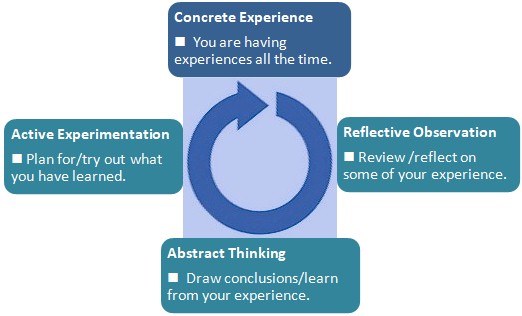 |
Integrative Critical Thinking Toolkit |
|
ICT Skill Worksheets
|
Skill Worksheet 2 Skill Worksheet 3 Skill Worksheet 4 |
Using the Worksheets
|
Self-reflection is a necessary habit for critical thinkers. To be a strong critical thinker means to habitually reflect on, and evaluate one's experience. The process of self-reflection can be envisioned as a continuous learning cycle grounded in a person's experience:

Many of our concrete experiences are noteworthy in some respect. Only you can say what might call for self-reflection at any given time. Only you know the people or situations or things that come to mind when you are thinking about how your day is going, or how it went. Often, the focus should be on a revisiting of some experience that may not have gone as well as you expected or wanted.
When you move into abstract thinking, interrogate your attitudes, assumptions, beliefs, and values that were involved in the experience. This is a difficult stage because it requires deep personal honesty and courage to face unpleasant truths about ourselves. By unmasking assumptions and clarifying your values, you can draw new conclusions about your life and where you want to go with your new insights.
New insights can lead to new plans for how you might capitalize on a strong skill, solve some personal problem, improve a relationship, foster social change, or contribute to your community and world.
Note
Self-reflection requires mental focus and personal honesty. Silence is very important. You must be able to hear your inner voice. Completing a Skill Worksheet requires self-reflection.
- Find a place that is quiet and comfortable.
- Turn off your phone, radio, television, or other media device.
- Eliminate all distractions if possible.
| Integrative Critical Thinking Toolkit | © 2020 Joseph K. Corrado |